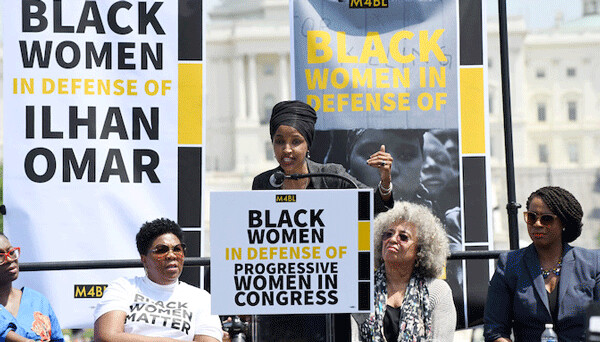Ilhan Omar to Trump: ‘Your demented views are not welcome here’

Last Saturday, the final day of the Jewish holiday of Passover, 19-year-old white supremacist John T. Earnest allegedly walked into the Chabad of Poway synagogue in California, raised his AR-style assault rifle and began shooting. He reportedly killed congregant Lori Gilbert Kaye as she stood in front of her rabbi, Yisroel Goldstein, protecting him. Eyewitnesses said Earnest shot Goldstein twice, blowing off part of his finger, and injured two others, then fled. He was arrested a short time later. A manifesto surfaced, which he allegedly wrote and posted online, riddled with anti-Semitic language. In it, he also took credit for an attempted arson of a mosque in nearby Escondido a month earlier. A message left on the mosque parking lot referenced the massacre at two mosques in Christchurch, New Zealand, in which 50 Muslim worshippers were gunned down. In his own manifesto, the New Zealand shooter described President Donald Trump as “a symbol of renewed white identity.”
On Saturday, Minnesota Democratic Congressmember Ilhan Omar tweeted: “My heart is breaking after today’s deadly shooting at Chabad Congregation in San Diego -- on the last day of Passover and 6 months to the day after the Tree of Life shooting. We as a nation must confront the terrifying rise of religious hate and violence.” She ended with “Love trumps hate.”
Since taking office in January, Omar, one of the first two Muslim women ever elected to Congress and the first in Congress to wear a hijab, has been frequently targeted by Trump. Most recently, he tweeted a video alternating between images of Omar and the 9/11 terrorist attacks. She has been targeted for her unabashed criticism of U.S. support of Israel’s occupation of Palestine. Death threats against her have spiked, and she’s been vilified by the right-wing media. Angered by the threats and vitriol, a group of prominent African American women rallied in front of the U.S. Capitol Tuesday, at a rally they called “Black Women in Defense of Ilhan Omar.”
“It is about time that we stepped up to defend those who represent our political vision on the front lines of struggle,” legendary activist, author and scholar Angela Davis said at the podium. “The attack against Congresswoman Ilhan Omar, while it is clearly directed at her as an individual, is also designed to dissuade all of us from speaking out on issues that are considered controversial ... the numerous threats of assassination from white nationalists and their supporters are a way of sending messages to other black women, to all who hold radical and progressive political views, that they, too, can be made into targets of vitriolic, violent racism: ‘Be quiet, or you will suffer the fate of Ilhan Omar.’”
Joining Angela Davis was historian Barbara Ransby, an adviser to the Movement for Black Lives. Princeton professor Keeanga-Yamahtta Taylor spoke, as did Alicia Garza, co-founder of #BlackLivesMatter. “From R. Kelly to Donald Trump, what we can no longer accept is the silencing of black women!,” said Ayanna Pressley, the first African American congresswoman ever elected from Massachusetts. Rashida Tlaib, the only other Muslim congresswoman, also spoke.
The crowd rose in a resounding ovation as Congressmember Ilhan Omar arrived. Her 17-minute speech was a damning indictment of Trump, saying he “and his allies are doing everything that they can to distance themselves and misinform the public from the monsters that they created, who are terrorizing the Jewish community and the Muslim community,” she said. “Because when we are talking about anti-Semitism, we must also talk about Islamophobia. It’s two sides of the same coin of bigotry.”
Trump said of Omar in a recent TV interview, “She is somebody that doesn’t really understand life, real life ... she’s got a way about her that’s very, very bad for our country.”
Whether Trump likes it or not, “our country” is also Omar’s country. At the rally, she said: “I don’t only represent one marginalized voice, because in this country being black is enough of being marginalized. But I also happen to be a woman. That’s a second marginalization. I happen to be a Muslim. And I also happen to be a refugee and an immigrant ... So, when [Trump] chooses to attack me, we know that that attack isn’t for Ilhan. [It’s] the continuation of the attacks that he’s leveled against women, against people of color, against immigrants, against refugees, and certainly against Muslims. We are collectively saying, ‘Your vile attacks, your demented views are not welcome here.’”
Ilhan Omar fled to the United States as a refugee from war in Somalia. “If I survived the militias,” she said, standing against the backdrop of the Capitol dome behind her, “I certainly can survive these people.”
(c) 2019 Amy Goodman and
Denis Moynihan Distributed by
King Features Syndicate
